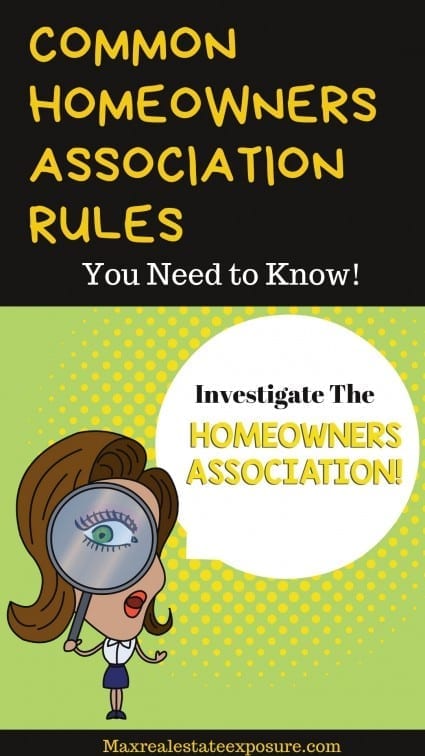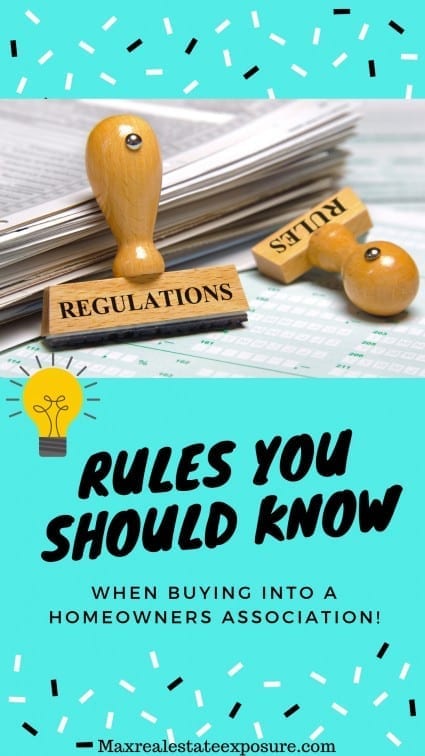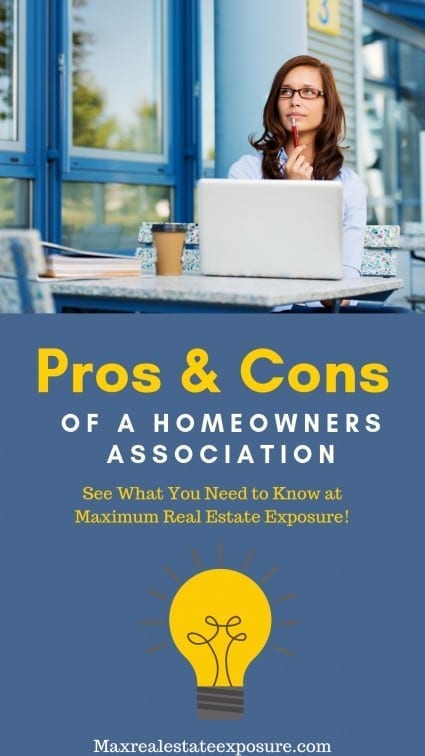What You Should Know About Homeowners Association Rules
 If you are shopping for a home right now or planning on doing so shortly, you will encounter homeowners associations (HOAs).
If you are shopping for a home right now or planning on doing so shortly, you will encounter homeowners associations (HOAs).
In all homeowner’s associations, some rules must be followed.
HOAs are management organizations that define and enforce rules governing condominiums and home communities.
Some consider them overbearing patrols that make homeownership harder than it has to be.
Others think of homeowner’s associations as essential organizations that work to maintain the integrity and value of the community. Without a doubt, there are pros and cons to having a homeowners association.
The following information can help you better judge living in an HOA community—including some of the main rules they tend to enforce.
It would help to always research a homeowners association’s rules before purchasing. Not doing so could put you in a place you’ll regret.
HOAs are very common with condos, townhouses, and to a lesser extent, single-family homes.
HOAs—What Are They?
Homeowners associations have power over the community for a variety of reasons. These organizations are actual legal entities that community members and management companies run.
The community members volunteer to create and abide by covenants, conditions, and restrictions (CC&Rs).
Membership is mandatory in the homeowners association if you buy a home where one exists. If there is a condominium association, you must also be part become part of it.
Ideally, the CC&Rs of the HOA should protect, enhance, and maintain the community’s homes and property. A primary argument for HOAs is that they create and enforce rules that will preserve the value of your property.
A lot of your property’s value comes from the homes surrounding it, so keeping all homes in the community up to the same standards can ensure that homes in that community retain their relative value over time.
Some benefits come with HOA membership beyond maintaining property value. These may include landscaping, trash pick-up, and exterior maintenance. Code enforcement also tends to benefit from being part of the homeowners association.
HOA fees finance the board’s and management company’s ability to maintain the community.
Do You Have to Follow The Homeowners Association Rules?
You can break the HOA rules, but doing so will result in a notice from the HOA and possibly a fine. How your HOA will deal with rule violations depends on the CC&Rs and how the management team enforces the rules.
Some HOAs will start with a warning letter, while others may jump right to fining you. How the rules are applied can also vary by the rule you break.
Remember that the HOA rules are legally binding and that you agree to abide by them when you sign your membership forms. The police can wind up enforcing some of the rules of the HOA, such as speed limits and dog leashing rules.
However, the police will not be called to enforce non-legal matters like paint or landscaping violations.
Common Homeowner’s Association Rules You Should Be Aware of as a Buyer
Now that you know the basics of HOAs, look at some of the most common homeowners association rules you will likely run into. Before purchasing a property where a homeowners association exists, you should ask yourself whether or not you’ll be comfortable with these rules or restrictions.
Some of these changes can feel drastic if you have owned a home or condo without a homeowners association. One of the better tips when buying a condo is to research the association rules and regulations before committing to purchase.
Your real estate agent should be able to assist you in finding out all of the rules and regulations for the association. Ensure you also ask some of the most vital questions before purchasing a condominium. Not doing so could put you in a position you’ll regret.
1. Homeowner’s Association Landscaping Rules
 The HOA is responsible for ensuring that the community looks a certain way, which means they will have rules concerning landscaping. Some restrictions will be apparent, like keeping your lawn from becoming overgrown and keeping the exterior neat.
The HOA is responsible for ensuring that the community looks a certain way, which means they will have rules concerning landscaping. Some restrictions will be apparent, like keeping your lawn from becoming overgrown and keeping the exterior neat.
However, some other rules may need to be examined to ensure you comply—like what kind of plants you can and cannot plant on your property.
If you have owned a home for years and are an avid gardener, can you imagine being told you’re not allowed to plant landscaping?
Being restricted for something like this can be extremely disturbing to many. Overly restrictive condo boards can put a damper on your happiness.
2. Homeowner’s Association Fence Rules
You can expect there will be rules surrounding fencing when in an association. The first is whether you will be allowed to add fencing.
If the HOA allows fencing, they will likely have requirements on the height and the type of materials used. They will want uniformity so the fencing does not stand out like a sore thumb.
It is also possible that the HOA must approve the contractor for fence installations,
3. Homeowner’s Association Rules on Rentals
One of the most critical homeowners association rules you need to know is the policy on rentals. Not every HOA will allow you to rent out your property.
You want to verify the rules concerning rentals to avoid expensive fines and legal issues. HOAs’ insurance is often based on the ratio of rentals to non-rentals, so they take renting seriously.
You should talk to your HOA about whether you can rent your property—you may need to get on a waitlist if no more rentals are allowed based on insurance rules.
Over the years, I have witnessed buyers purchasing a condo to rent it, only to find out they were not allowed to do so. Imagine yourself in this position. It’s not a great feeling!
Many condominium associations have specific rules about renting. Typically, only a certain percentage of units are allowed to be rented at any given time.
While on the surface, this restriction may not seem like a good thing, it has been shown that when rental rates become too high, property values are not maintained.
Also, many lending institutions will not grant mortgages on condo complexes with a high percentage of rental property. You should find out if the condo is warrantable or not.
Another essential thing to check out when buying a condo is whether or not you can use an FHA loan. You should know if the complex is FHA-approved if you own a condominium. Not having FHA condo approval can hamper sales, potentially lowering market values.
4. Homeowner’s Association Rules For Renters
Renters are required to follow all of the rules established by the homeowners association. When renting a condo, a landlord should provide the tenant with a copy of the HOA rules so they understand what’s expected of them.
Landlords are often tasked with ensuring their tenants follow the rules and regulations. When signing a lease, a landlord should make the CC&R and rules part of the rental agreement.
5. Homeowner’s Association Rules on Vehicles
Homeowners associations usually have car rules, including how many vehicles you can have on your property, where those vehicles can park, and what type of vehicles you can have. There may be limits on commercial vehicles allowed, RVs, boats, and more. There will almost certainly be speed limit rules as well.
It will be essential to check how many deeded parking spaces come with your home or condo. You should also check where the guest parking is located and if there are any restrictions.
6. Homeowner’s Association Dog Rules and Other Pets
 Many HOAs have rules concerning pets, such as whether you have to leash your pet, how many pets you can own, and what kind of pets you can own. There may be restrictions about where you can and cannot walk your pet.
Many HOAs have rules concerning pets, such as whether you have to leash your pet, how many pets you can own, and what kind of pets you can own. There may be restrictions about where you can and cannot walk your pet.
If you have one or more pets, they are probably quite important. Verify if you can have your pet without breaking the rules before considering a condo or home governed by an association.
Bonus tip: how to move with pets.
7. Homeowner’s Association Rules About Trash
There will likely be rules about waste in the HOA you are considering. The rules may include limits on what you can dispose of in community dumpsters, like trash and boxes that have not been broken down, as well as when you can take your trash cans out to the curb and when you have to bring those trash cans back in.
Ensure you do your due diligence on something as crucial as trash pickup.
8. Homeowner’s Association Rules Concerning Holiday Decorations
HOAs often have strict rules about holiday decorations, such as rules on how elaborate your holiday decorations can be and what size those decorations can be. They may also have rules about when to put your holiday decorations up and when you must take them down.
If you tend to leave your lights up long after the holiday season, you may not like the limits the HOA sets on your decorations.
You might also be patriotic and love showing your patriotism with a beautiful flag. Believe it or not, some associations will not let you do so.
How Un-American, right? It is possible an association will not be able to stop certain flags from being displayed. You can learn in what circumstances this is the case in the excellent article from NOLO.
9. HOA Rules Regarding Noise
Many HOAs will have rules concerning noise. They will often have hours when noise is allowed and hours when sound needs to be limited. Noise limitations are common outside of HOAs, as many counties and cities have noise ordinances.
However, your neighbors in the HOA are more likely to take notice if you are making noise outside of proper hours if the HOA has noise rules than neighbors outside of an HOA might be. One of the most significant objections for folks living in condos with a party wall is noise.
Do much research to determine if your adjoining neighbor will be a nuisance.
10. Homeowner’s Association Exterior Storage Rules
Many HOAs will have rules about what you can and cannot store outside of your home, as well as what types of exterior storage you can or cannot have. For example, the HOA may require you to put things like bikes and kayaks out of site when you store them.
The HOA may also limit or prohibit the construction of exterior storage buildings on your property. If you were hoping to put up a shed to hold all your tools and lawn equipment, you should ensure the HOA will allow you to have one.
11. Homeowner’s Association Rules Regarding Design Changes
Almost all HOAs have rules that require you to keep your home’s design similar to the other homes in the community. That means you will probably be breaking the rules if you paint your home a different color, add a deck to the home, add a patio, or even do something as simple as changing the type of mailbox you have in front of your house.
Making small design changes to the home may be possible, but you will most likely need written approval from the HOA. Do not be surprised if your request is denied if the changes you want will make your home stand out from all the other houses on the block.
When buying into a homeowners association always make sure you can live with the rules!Click To TweetHow to Find Homeowner’s Association Rules
There are many ways you can get your hands on the HOA rules. The following are some of the best methods:
- Ask one of the officers of the homeowner’s association for a copy.
- Ask your real estate agent to provide a copy if you buy or sell.
- Ask a real estate agent to do a title search and get a copy for you.
- Go to the local registry of deeds where the property deed is recorded. They will have a copy on file.
What Should You Do If the HOA Says You Committed a Violation?
It can be upsetting if your HOA calls you out for a rules violation, but it does not have to be the end of the world. There are a few things you can do to limit the frustration, including:
- Address the problem directly with the HOA.
- Get involved in the HOA to develop a personal relationship with those enforcing the rules.
- Don’t take it personally—understand that the rules are the rules, and you will have to navigate them as a homeowner in the community.
It is possible you could find yourself in a situation where you feel the association is going way overboard on nit-picking things in the neighborhood. Here is how to deal with a condo association that could be overstepping its bounds.
Homeowner’s Association Rules Enforcement
Many often ask whether a homeowner’s association can legally enforce its rules. The answer is they can and often do. When you violate HOA rules, you can be fined. It is also possible when you do not pay the required fees; they can put a lien against your property.
An HOA can also take you to court to enforce compliance with the community’s rules. The rules and regulations of a homeowner’s association should never be taken lightly.
When Are HOA Rules Not Enforceable?
A homeowner’s association cannot enforce rules under a few limited circumstances. For example, they cannot implement practices that break the law or violate a proper owner’s rights. An HOA must also follow uniform procedures when enforcing rules. They cannot have favorites among homeowners.
All enforcement must be done across the board to all members of the HOA.
 Pros and Cons of an HOA
Pros and Cons of an HOA
Whether or not you will like an HOA comes down to personal preference. Some owners find they love living with a homeowners association, while others find they despise it. Here are some important considerations for you to consider:
Pros
- Home values will likely benefit from the rules and stability of the appearance and constant maintenance of the property.
- Most HOAs provide access to additional amenities such as a tennis court, swimming pool, gym, playground, clubhouse, or security.
- HOA boards will mediate disputes between neighbors for property-related issues that violate rules, obnoxious noise, pet problems, and broken regulations.
Cons
- HOAs have significant discretion over what you do with the exterior of your property.
- You probably will be restricted to specific paint colors, exterior design, or things you are used to controlling, like having a pet.
- Depending on the neighborhood, rising HOA fees could hinder your finances.
- Some HOAs can become out of control if the wrong people run them. You could see fines or aggressive, harassing letters about breaking specific rules.
- Associations can fine you or even put a lien on your property for not following property guidelines.
Final Thoughts on Homeowner’s Association Rules
Depending on the person, some associations will be considered overly restrictive or under-restrictive. It will be vital for you to understand your tolerance level for rules and regulations or lack thereof.
Most of the time, the reason someone is unhappy with their living conditions in an association is determined by the rules.
Additional Helpful Real Estate Resources
- Advice for Millennial home buyers – see some great tips for buying a house for the first time. Purchasing a home for the first time takes a lot of patience. The time invested, however, is almost always worth it.
- Why a USDA loan could make sense – Do you know why a USDA loan might be the perfect loan choice? Discover what makes this type of mortgage a worthwhile financing option.
- Should I get a second mortgage or home equity loan – learn the pros and cons of going with each of these types of financing options.
Use these additional resources to make the best financial and home-buying decisions.
About the Author: The above Real Estate information on homeowners association rules you need to know was provided by Bill Gassett, a Nationally recognized leader in his field. Bill has expertise in mortgages, financing, moving, home improvement, and general real estate.
Learn more about Bill Gassett and the publications he has been featured in. Bill can be reached via email at billgassett@remaxexec.com or by phone at 508-625-0191. Bill has helped people move in and out of Metrowest towns for the last 37+ years.
Are you thinking of selling your home? I am passionate about real estate and love sharing my marketing expertise!
I service Real Estate Sales in the following Metrowest MA towns: Ashland, Bellingham, Douglas, Framingham, Franklin, Grafton, Holliston, Hopkinton, Hopedale, Medway, Mendon, Milford, Millbury, Millville, Natick, Northborough, Northbridge, Shrewsbury, Southborough, Sutton, Wayland, Westborough, Whitinsville, Worcester, Upton, and Uxbridge MA.


 Pros and Cons of an HOA
Pros and Cons of an HOA